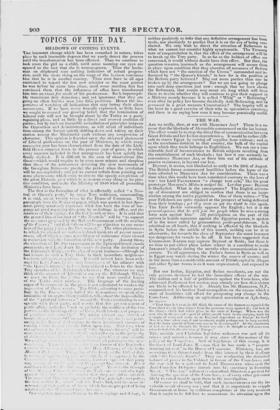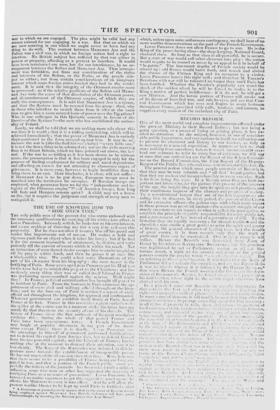Tore speeches of hi , E:inburell erbeirers ; ft,r, wlooever We
may r But our Indian, Egyptian, and Syrian merchants, are not the think oldie :noint; sf Liberalism mere; the Edinburgh Whigs, only persons destined to feel the immediate effects of the war. we must do thetil the is-ties to soy that more cordial haters The million and a la' of petitioners against the Corn-laws who of the '1' ories exist nowhere. The lansInag" "f the leading addressed Parliament last session, may already see how their c'inims organ of Government hi the press i, not calculated to weaken the are el 1 omoy to be effected by it. Already has Mr. Ilisameros, M.P., impression of the-e c1:ts. A lie GI,,b-, :Averting to some persi- congratulated his brother fbod-monopolists on the excuse which a fiage in the 17,, ,, ,..!.: !I lialkil ti.: temsactions we speak of as state of hostilities w ill afford fbr postponing any change in the indicative of an z.;,i,r, . ,.b:::,! coalition, talks about the impossibility Corn-laws. Addressing an agricultural association at Aylesbury, of the " practical settesunal " among the 'forks continuing to co- operate a itli their 1 1..ty, at 'I a ocrts that the paasolt aspect or " That time hot p.m., he did think the muse of the farmers as regarded the pnblie affaiN he.th::.t,:i " e',t ::0 14*Ohtlh1:: thf; COLtlit:' II Of the 1'V) . Corn. laws ts.1•,.in •■■171l! drIllf.Y.r frOM the immense in against it; but look at part., a :-. t!e, br, ,1!:- up of' I.T. ! (...1.!1•:•!, t, , !I i7,ti.tit i ',.,,3 plirp,:: no, than,,.,, ,...I,H, had taken piave in the state of Europe. IS here was the
.
HI ,- l',.:: ,,,i•,:.t, .., :! '.,,,.. ,., :. , , ..,,„.11 „f. ,,,,,,, ,i,„ ,„ the ,,,. ,, ,,t -p, et of alrair.: svoahl trust to the carrying. trade for , • a -nonly of corn, :old 1,1ake us in Ell;:■:11111 dependent on Enema: hie held? itna '2 . • ( ). f ' , • : : : , ' 1 L . - ' ;' " ' 1"1-1J- toss it a time alien m.;ir, if not itunducut, might I...di:111s not be it art rte(), slat: ea ,:. ", 1" ',hie" :..;•'jt:w;ial -:,son::; nf thst the home growth of cood•rorn wa., to be discouraged ? At the conclusion t010:li'4 ■ Wien upoo him. Mini N ss, when of. 1,-t ,.• -i,,n be thoogtt the farmer me; sate : he ihonyht so still sews sw, 111‘..C', .' . IA will 0..ee hi the wile:thy This amiable and Chsistion legislator WeleellieS tear and all its of z .s. . :es- It. I ;1 st ill's-iefigth. crime i and miseriss, le cause it may stave oil' disc ussions of the We , .•:. ;,,,H,:.,.!- !,, the ,am,: y or the (.,,iii-1;:\+:,. Anil of legislators of this stamp, it is C(..r.'.. ■ i' l': k■•(! Of t H '• lfsn:esdes the boest of Lord Jolts Ressimr. that he has made a " Napoli- to r.. it ,.... .1I:..,1 •Q ; el. ; hi. it the deviling interest" in the I louse of Commons. Ministers, too, are lila • !1 teas. s. the 1.-o li ,,i .Joly reeruiting their thinned ranks (Ism this interest by their dealings ht E,. .!:. ]! : , ; eprovi d, he the with "the Queens l'riends." They are neoljusiing the disturbed 1.','%,:',, i ' p;.,-.,-11 tbittt porty bahlbc,: of 1,0v.( r in liii Callinct in litcour of the Corn-laws; and ma.,, -. ; e , st (;,,.. I 1,1,,i :it, /1 i:: e tile. Y,itr will he a god-roil to Lord Altasamicso: abet' next the ..,,,/,•." 'F. r,, I i the triumph Anti-Corn-law Deletsatts intrude into his onietuary in 'homing of I ' ' 'l e.:, . ere H - set or a tool!: Street. " The nar ' ail! next st ssion :dna(' SI inistera a pretext Ihr asas 1.;.•;t. ii,,,y ;;;. Iia, 1,:, •;■I i Iii,d. iii,j,ilig the (ilic■.61■11 of the Corn-lows, as of tsar:, other grievance I .a: mole in- Of course ac shall be told, that such inconveniences are the in- w ..', f r.. i ..,. L, Is has ire prospect of* being evilable t 'emit of every aor ; and that it is unpatriotic to cripple isieoes .. 'J:1,,•. G(M:rliiill'Ilt tit blinie by NNlifiOilli el/ilipbdillti at the very 11101/1"t 0,r r, 1', th'• ": ,:, :, iris and (1,111g4, in that it ought fit be left lice to conectitratt! its IltiVntion upon the war in which we are engaged. The plea might be valid had any reason existed for our engaging in a war. But that on which we are now entering is one which we ought. never to have had any thing to do with. The contest between 3IIMEMET ALI and the Sultan was at civil war, in which no foreign nation had a right to interfere. No British subject has suffered by that war either in person or property, affording us a pretext to interfere. It would have been terminated ere now, but tbr our interference, by an ar- rangoment between the Sultan and :Nlansmier Am. That arrange- ment was forbidden, not from any consideration of' the rights and interests of the Sultan, or the Pasha, or the people sub- ject to either; but from certain considerations of an imaginary interest which some foreign states ffincied they had in the settle- ment. It is said that the integrity of the Ottoman empire must be preserved : as if the relative positions of the Sultan and 111s11i- NET ALI were the cause of that dissolution of the Ottoman power, and dismemberment of the Ottoman empire, of which they are really the consequences. It is said that MallEMET Am is a tyrant, and that the Syrians must be rescued feom his grasp : then, why do those who interfere to snatch them front it oiler at the same time to give him a more assured lease of power over the Eg■ pt hums? Who is our colleague in this Quixotic crusade in favour of the liberties of the Syrians ?—the man who has annihilated the nation- ality of Poland. Lastly, we shall be told that we are making more ado about this scar than it is worth ; that it is a trilling undertaking, NN'hiell will he achieved immediately; that the power of AlanismEr Am is entirely dispoTortioned to the fierce arrayed against him. It may be so : because the war is (like the frail fair or,C.i baby) " a very little one," it is not the less a thing to be ashamed of; nor are the evils aceruieg from it to Great Britain, which we have pointed out above, the less real. It' the war be as trifling as it has been shown to be without cause, the presumption is that it has been engaged in only for the purpose of finding employment for military and. naval dependents, and allbrding an excuse fur not attending to clamorous urgers of'
grievances. It is more easy, however, to begin hostilities than to bring them to an end. Mere blockades, it is clear, will not suffice : if .Talmtamsr Am is to be put down, European troops must be marched into the territories he occupies. It' Russian troops are employed, what guarantee have we for the " independence and in-
tegrity of the Ottoman empire" ?5—if Austrian troops, bow long will Italy and Hungary remain quiet ? A child may set a house on fire, but it requires the judgment and strength of ninny men to
extinguisli it. •



























 Previous page
Previous page